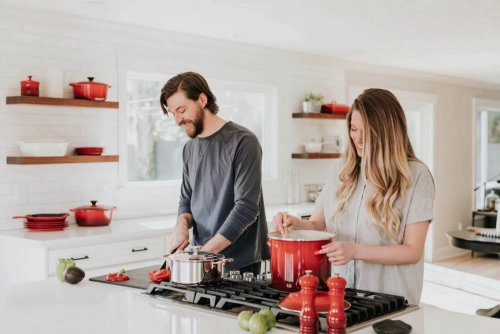Living with food allergies can be overwhelming—not just for the person with allergies but for their loved ones as well. As someone who lives with food allergies and is a therapist specializing in food allergy anxiety and trauma, I’ve seen firsthand how challenging it can be to navigate this journey together. But I’ve also witnessed the power of partnership, advocacy, and empathy in creating a safe and supportive environment. If your spouse lives with food allergies, here are some strategies to help you support them emotionally and practically.
In this blog, we’ll explore practical strategies for supporting your spouse, from creating a safe home environment to navigating social situations. We’ll also discuss the emotional aspects of food allergies and provide concrete steps for being an effective advocate and partner.
Understanding the Scope of Food Allergies
The emotional toll of food allergies can be significant. Your spouse may experience anxiety about dining out, attending social events, or even eating at home if cross-contamination is a concern. In some cases, past experiences with severe allergic reactions can lead to trauma, making even the thought of exposure overwhelming. Understanding this context is key to offering meaningful support.
According to FARE (Food Allergy Research and Education), food allergies affect approximately 32 million people in the United States alone, including 26 million adults and 5.6 million children. That’s roughly 1 in 10 adults and 1 in 13 children. These numbers highlight the prevalence of food allergies, but they don’t capture the daily stress and vigilance required to manage them.
Become an Educated Partner
Knowledge is power, especially when it comes to food allergies. Take the time to learn about your spouse’s specific allergies, including the symptoms of an allergic reaction and how to use emergency medications like epinephrine. Familiarize yourself with common allergens and hidden sources of exposure. This not only demonstrates your commitment but also equips you to respond confidently in case of an emergency.
For example, if your spouse is allergic to peanuts, learn to read food labels thoroughly and avoid phrases like “may contain” or “manufactured in a facility that processes peanuts.” Small steps like these can make a big difference in building trust and reducing anxiety.
Create a Safe Space at Home
Home should be a sanctuary, especially for someone managing food allergies. Work together to establish guidelines for your household, such as:
- Avoiding allergens entirely: If possible, consider making your home a safe zone by eliminating the allergen altogether.
- Using separate cooking tools: Have designated cookware, cutting boards,storage containers, and utensils for allergen-free meal prep to avoid cross-contamination.
- Reading labels together: Develop a habit of checking labels before bringing new foods into the home.
By proactively creating a safe environment, you help alleviate some of the mental load your spouse carries.
Be an Advocate in Social Situations
Social events can be a minefield for someone with food allergies. As a supportive spouse, you can play an invaluable role by advocating for their needs:
- Communicate with hosts: Before attending gatherings, reach out to the host to discuss the menu and potential allergens. Offer to bring a safe dish your spouse can enjoy.
- Speak up at restaurants: Don’t hesitate to ask detailed questions about ingredients and food preparation. For example: “My spouse has a tree nut allergy. Does your kitchen contain tree nuts? If so, how do you ensure there will not be cross-contamination?” Your willingness to advocate alongside your spouse can make them feel less isolated.
- Help set boundaries: If your spouse feels uncomfortable in certain situations, support their decision to leave or opt out without guilt or pressure.
- An example of this is saying to your spouse: “We can leave and grab something safe for you to eat elsewhere. No pressure at all.”
- An example of what to share with the host is: “Unfortunately, [spouse’s name]’s allergies make it a bit tricky to navigate the food options tonight, so we’re going to head out a bit early. We’re so sorry we couldn’t stay longer. Let’s plan to get together soon when we can find something that works for everyone!”
It’s worth noting that cultural and family traditions often center around food, which can be particularly challenging for those with food allergies. Work with your spouse to find ways to participate in meaningful traditions while staying safe. This might mean adapting traditional recipes, bringing safe alternatives to family gatherings, or creating new traditions that honor both cultural heritage and your spouse’s safety needs.
Support Emotional Well-Being
Food allergies aren’t just a physical condition; they’re also an emotional and mental health challenge. Your spouse may feel anxious, frustrated, or even embarrassed about their allergies. Here are some ways to offer emotional support:
Validate their feelings: Let your spouse know it’s okay to feel overwhelmed. Phrases like “I can see how hard this is for you” or “Your feelings are valid” go a long way in fostering connection.
Encourage professional help: If anxiety or trauma related to food allergies is impacting their quality of life, encourage them to seek therapy. A trained professional can help them develop coping strategies and work through any fears or past experiences.
Practice patience: Managing food allergies requires constant vigilance, which can be exhausting. Be patient with your spouse—and with yourself—as you navigate these challenges together.
Celebrate Wins Together
Living with food allergies can feel like an uphill battle, but it’s important to celebrate progress and victories, no matter how small. Did you successfully navigate a new restaurant? Prepare a delicious allergen-free meal together? These moments are worth acknowledging and cherishing. They serve as reminders of the strength of your partnership and the resilience of your spouse.
Be Prepared for Food Allergy Emergencies
A crucial aspect of supporting your spouse is maintaining emergency preparedness. Keep multiple epinephrine auto-injectors in easily accessible locations—at home, in cars, and in your bags. Create and regularly review an emergency action plan that includes:
- Symptoms to watch for
- Emergency contact numbers
- Step-by-step instructions for administering medication
- Locations of nearby emergency rooms
- A list of your spouse’s allergies and current medications
Make copies of this plan available to family members and keep digital versions on your phones. Regular review and updates of this plan can help both of you feel more confident and prepared.
Final Thoughts
Supporting a spouse with food allergies is an ongoing journey that requires empathy, education, and advocacy. By being a proactive partner, you’re not only helping to keep them physically safe but also providing the emotional security they need to thrive. Remember, you don’t have to have all the answers or be perfect—your willingness to learn and grow together is what truly matters.
If you or your spouse are feeling overwhelmed by the challenges of managing food allergies, consider reaching out to a therapist who specializes in this area. With the right tools and support, you can build a life that is not only safe but also full of joy and connection.
A Branchburg NJ Therapist Can Help you and your Loved Ones Learn to Cope with Food Allergy Anxiety and More!
Struggling with food allergy anxiety? Our specialized therapists at Brave Minds Psychological Services are here to help. Our therapists acknowledge the struggles of people managing food allergies and the effects on their families. You don’t need to explain yourself here.
Access free resources, including our food allergy blog, on our website or check us out on social media @bravemindsnj.
Start your journey today:
- Contact us to Schedule a consultation
- Speak with a food allergy-informed therapist
- Begin healing from food allergy anxiety
Beyond Food Allergy Anxiety in NJ
We also offer a range of services beyond food allergies, including EMDR, couples counseling, postpartum and birth trauma therapy, trauma therapy, and more for adults, teens, and children. Join us in person in Scotch Plains or Branchburg, NJ, or online across New Jersey.
Take the first step—reach out today!






